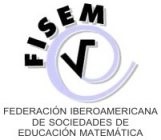Construir comunidade em Educação Matemática
Resumo
As sociedades esperam que cada vez mais professores de matemática possam oferecer melhores oportunidades de aprendizagem aos seus alunos. Para isso, as universidades oferecem esquemas de formação que costumam ser de alcance reduzido e que fornecem soluções parciais às necessidades dos professores. O desenvolvimento e a consolidação de comunidades de professores que ensinam matemática é um caminho para contribuir com esse propósito. Neste artigo, apresentamos os recursos e espaços de interação que a UED, o centro de pesquisa e formação em Educação Matemática da Universidade dos Andes, criou para a consolidação de a comunidade AYEM.
Downloads
Referências
Brodie, K. (2014). Professional Learning Communities in Mathematics Educa-tion. In S. Lerman (Ed.), Encyclopedia of Mathematics Education (pp. 501-505). Springer. https://doi.org/10.1007/978-94-007-4978-8_130
Figueroa, M., García, S., Maldonado, D., Rodríguez, C., Saavedra, A. M., & Vargas, G. (2018). La profesión docente en Colombia: normatividad, formación, selección y evaluación. Documentos de Trabajo EGOB, 54, 1-90.
Goos, M. (2020). Communities of practice in mathematics teacher education. In S. Lerman (Ed.), Encyclopedia of Mathematics Education (pp. 107-110). Springer.
Goos, M., & Geiger, V. (2012). Connecting social perspectives on mathematics teacher education in online environments. ZDM, 44, 705-715. https://doi.org/http://dx.doi.org/10.1007/s11858-012-0441-y
Goos, M. E., & Bennison, A. (2008). Developing a communal identity as beginning teachers of mathematics: Emergence of an online community of practice. Jour-nal of Mathematics Teacher Education, 11, 41-60. https://doi.org/http://dx.doi.org/10.1007/s10857-007-9061-9
Herrington, A., Herrington, J., Kervin, L., & Ferry, B. (2006). The design of an online community of practice for beginning teachers. Contemporary Issues in Techno-logy and Teacher Education, 6(1), 120-132.
Jaworski, B. (2020). Communities of inquiry in mathematics teacher education. In S. Lerman (Ed.), Encyclopedia of Mathematics Education (pp. 102-104). https://doi.org/http://dx.doi.org/10.1007/978-94-007-4978-8_24
Llinares, S., & Krainer, K. (2006). Mathematics (student) teachers and teacher educa-tors as learners. In A. Gutiérrez & P. Boero (Eds.), Handbook of Research on the Psychology of Mathematics Education. Past, Present and Future (pp. 429-459). Sense Publishers. https://doi.org/http://dx.doi.org/10.1163/9789087901127_016
Nickerson, S., & Sowder, J. (2002). What factors influence the formation of teachers’ professional communities and why should we care? 26th Conference of the In-ternational group for the Psychology of Mathematics Education. Volume 3, Nor-wich.
Østergaard, K. (2013). Theory and practice in mathematics teacher education. Pro-ceedings of the IVth international congress on the anthropological theory of di-dactics (ATD),
Rust, F. O. C. (2009). Building bridges between early childhood educators and educa-tion policymakers. Contemporary Issues in Early Childhood, 10(3), 260-262. https://doi.org/http://dx.doi.org/10.2304/ciec.2009.10.3.260
Shonkoff, J. P. (2000). Science, policy, and practice: Three cultures in search of a shared mission. Child development, 71(1), 181-187. https://doi.org/http://dx.doi.org/10.1111/1467-8624.00132
Tseng, F.-C., & Kuo, F.-Y. (2014). A study of social participation and knowledge shar-ing in the teachers' online professional community of practice. Computers & Ed-ucation, 72, 37-47. https://doi.org/https://doi.org/10.1016/j.compedu.2013.10.005
Wenger, E. (1998). Communities of practice. Learning, meaning, and identity. Cambridge University Press.
Direitos de Autor (c) 2024 Pedro Gómez,Paola Castro,Mariana Ramírez

This work is licensed under a Creative Commons Attribution 4.0 International License.
O material publicado na revista é distribuído sob a licença Creative Commons International Attribution 4.0 (CC-BY 4.0). Esta licença permite que outros distribuam, misturem, ajustem e desenvolvam seu trabalho, mesmo para fins comerciais, desde que você seja creditado com a criação original. Os autores das obras publicadas na Revista Unión mantêm seus direitos autorais sem restrições.
##plugins.generic.dates.accepted## 2024-08-27
##plugins.generic.dates.published## 2024-08-30








.png)






